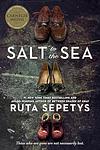The Greatest "East Prussia" Books of All Time
Click to learn how this list is calculated.
This list represents a comprehensive and trusted collection of the greatest books. Developed through a specialized algorithm, it brings together 290 'best of' book lists to form a definitive guide to the world's most acclaimed books. For those interested in how these books are chosen, additional details can be found on the rankings page.
Genres
The "East Prussia" category for books encompasses a range of literary works that delve into the historical, cultural, and geographical aspects of the former German province of East Prussia. This region, which once lay on the southeastern coast of the Baltic Sea, has a complex past marked by Teutonic Knights, the Kingdom of Prussia, and its integration into the German Empire. The books in this category may explore its unique blend of German, Polish, and Lithuanian influences, the tragic displacement of its population during and after World War II, and the eventual absorption of its territory by the Soviet Union and Poland. Titles within this genre could include historical accounts, personal memoirs, cultural studies, and even fictional narratives set against the backdrop of East Prussia's rich and tumultuous history.
Countries
Date Range
Reading Statistics
Click the button below to see how many of these books you've read!
Download
If you're interested in downloading this list as a CSV file for use in a spreadsheet application, you can easily do so by clicking the button below. Please note that to ensure a manageable file size and faster download, the CSV will include details for only the first 500 books.
Download-
1. August 1914 by Aleksandr Solzhenitsyn
"August 1914" is a historical novel set during the early days of World War I, focusing on the disastrous Battle of Tannenberg on the Eastern Front. The book provides a detailed portrayal of the Russian army's defeat, largely due to incompetent leadership and lack of communication. The narrative also delves into the lives of the soldiers and civilians involved, offering a broad examination of Russian society and the impending revolution.
-
2. The Works Of Johannes Bobrowski by Johannes Bobrowski
This book is a comprehensive exploration of the literary contributions of Johannes Bobrowski, a significant figure in 20th-century literature. Through detailed analysis and commentary, the author, Ivan Bobrovsky, delves into Bobrowski's poetic and narrative works, highlighting his profound engagement with history, memory, and the landscapes of Eastern Europe. Bobrovsky's examination not only sheds light on the thematic and stylistic nuances of Bobrowski's writing but also situates his oeuvre within the broader context of European literature, revealing the depth and complexity of his engagement with the tumultuous history of the region. Through this meticulous study, the reader gains insight into Bobrowski's unique literary voice and his enduring legacy as a writer deeply attuned to the nuances of human experience and historical memory.
-
3. Salt To The Sea by Ruta Sepetys
The novel is a poignant historical fiction set during World War II, which follows the intertwining fates of four young people from different nations and backgrounds as they desperately flee the advancing Soviet army in East Prussia. Their paths converge en route to the ill-fated Wilhelm Gustloff, a German evacuation ship that promises salvation from the encroaching war. The narrative, rich in detail and emotion, explores themes of guilt, redemption, and survival, while bringing to light one of the most tragic and little-known maritime disasters in history. Through their harrowing journey, the characters confront the brutal realities of war and the impact of their choices amidst a world torn apart by conflict.
-
4. Shadow Lands by Johannes Bobrowski
"Shadow Lands" is a poignant exploration of the historical and cultural landscape of Eastern Europe, delving into the complex relationships between the German minority and the Slavic peoples during the interwar period. The narrative weaves together themes of memory, loss, and the inexorable passage of time, as it reflects on the impact of war, displacement, and the search for identity amidst the shifting borders and political turmoil of the 20th century. Through lyrical prose and rich characterization, the novel paints a vivid portrait of a region haunted by its past, grappling with the ghosts of its diverse ethnic heritage and the scars left by conflict.
Reading Statistics
Click the button below to see how many of these books you've read!
Download
If you're interested in downloading this list as a CSV file for use in a spreadsheet application, you can easily do so by clicking the button below. Please note that to ensure a manageable file size and faster download, the CSV will include details for only the first 500 books.
Download


